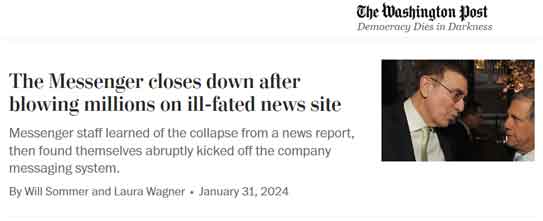
Bad news for the media often feels like good news for conservatives.
So word that Vice and BuzzFeed are laying off hundreds of journalists, weeks after the complete collapse of The Messenger, won't elicit much sympathy from the right.
Then again, it's not just conservatives who disapprove of the news business today:
Gallup last year found a paltry 32% of Americans say they have "a great deal" or "a fair amount" of trust in the mass media.
The same survey found 29% had "not very much" trust in the media — and a record-setting 39% confessed they had "none at all."
Last month the Los Angeles Times announced it was reducing its newsroom by more than 20%.
Jeff Bezos' Washington Post has also been through rounds of buyouts and cutbacks.
But the troubles of traditional newspapers are often taken for granted.
A decade ago, online outlets like Vice and BuzzFeed were meant to be the future of media — new species adapted for the internet ecosystem.
That's now the problem: those sites and others staked their survival on algorithms they don't control.
First came "search engine optimization," then gaming the algorithms that decide what content gets served to millions of Facebook and Twitter (now X) users.
BuzzFeed was notorious for "listicles," which were addictively easy to share until Facebook became so saturated with BuzzFeed and Thought Catalog junk that Mark Zuckerberg's platform decided to change the rules.
After all, how much clickbait could readers take?
Online media startups attracted investment by showing phenomenal growth, but it was like an athlete on steroids.
Entrepreneurial young journalists, well-connected with classmates and former colleagues at established outlets, garnered hype and headlines from their friends.
That sparked investor excitement, and with investors' money, new sites could show a rapid explosion in traffic — since they were starting from nothing.
But how could they maintain investor-dazzling double-digit growth after the first spurt?
The social media on which the news sites depended faced the same problem.
The solution for Facebook, once new users started tapering off, was to get existing users to spend more time on the site, which meant no longer sending them to other sites, like news sources, through links.
Now Facebook and X make it nearly impossible to promote journalism on their sites; they want the eyeballs to stay on their own platforms.
When social media were young, they needed to maximize traffic, which meant playing host to any kind of content users wanted, including news.
YouTube and Facebook felt like the Wild West in those days, with neither copyright law nor political correctness putting a damper on what users could share.
Today politics isn't the main reason social media suppresses news, but it's an aggravating factor, as The Wall Street Journal's Kyle Smith recently noted on X.
Smith pointed out that progressive campaigns to shame advertisers into abandoning Fox News, or X itself under Elon Musk's ownership, encourage advertisers to avoid all political risk.
Budweiser's humiliating losses after turning the transgender "influencer" Dylan Mulvaney into a brand representative demonstrated how much it could hurt to alienate conservatives.
So why advertise with any politically charged news organizations?
If left-leaning sites like Vice and BuzzFeed are collateral damage in progressives' war on right-of-center political expression, that may seem like just deserts, as well as a poignant irony.
But the wider lesson is that online media was never on a secure footing, dependent as it was not just on advertising — which is true for almost all media — but on the whims of Big Tech, which has its own growth worries.
Newspapers, by contrast, flourished as local institutions sustained by local retailers.
The emergence of online national and even global retail, however, has meant ad spending isn't dictated by geography any more.
Businesses can reach consumers directly or cast a wider net by buying a little exposure on large platforms like Google or Facebook.
Yet not only news but our very system of government is built on localism — on distinct cities, towns, states and congressional districts.
Newspapers served as their town halls, even more than physical town halls did.
The wipeout of hype-driven, placeless new media isn't a cause for celebration, but it's not a disaster for our republic.
The loss of local distinctiveness, on the other hand, is at the root of much of our polarization and deadlock today.
In "Democracy in America," Alexis de Tocqueville argued "that the number of newspapers must diminish or increase amongst a democratic people, in proportion as its administration is more or less centralized."
Fewer newspapers means more centralized power — and more conflict over it.
Conservatives who don't want that have reason to want newspapers to survive.
And newspapers that want to survive have to fight hard for local interests and values — including conservative ones.
(COMMENT, BELOW)
Previously:
• 02/20/24: Do Americans Trust Either Party?
• 02/13/24: Vladimir Putin -- A Passive Aggressor
• 01/23/24: Will 'Lawfare' Take Trump Off the Ballot?
• 01/16/24: Will Africa Save America?
• 01/09/24:'The Sopranos' at 25: A new world tragedy
• 01/02/24: Trump, Biden and a Fight for the Heart
• 12/12/23: What Happened to Ron DeSantis?
• 12/12/23: Biden Looks Doomed -- But Is He?
• 12/05/23: A Test for Trump and His Rivals
• 11/21/23: When Inequality Is Fatal for Men
• 11/14/23: Nevermind, The Battle's Over
• 11/07/23: War in the Dem Party -- and at the Opera
• 10/24/23: Israel's Lesson for 2024: A Lib Crackup
• 10/17/23: Libs' Dilemma: Immigration or Israel?
• 10/10/23: Why Bidenflation Defines Bidenomics
• 10/03/23: Will Gavin Newsom Copy Trump?
• 09/26/23: Biden's a Loser -- but Dems Can't Ditch Him
• 09/19/23: Do Sex Scandals Matter?
• 09/12/23: Cornel West Spells Doom for Biden
• 09/05/23: What Trump Does for Democracy
• 08/2/23: Ramaswamy: A Trump Versus Trump?
• 08/22/23: Take 'Rich Men North of Richmond' Seriously
• 08/16/23: How America Kills Its Own
• 08/08/23: The Biden Pardon That Can Spare America
• 08/01/23: Harding, a consevative for the ages
• 07/25/23: Demography Destiny, for Us and China
• 07/18/23: The Frontrunner Who Looks Like a Loser Is Biden
• 07/11/23: Britain's Bad Example for American Conservatives
• 07/05/23: Could We Still Win a Revolutionary War?
• 06/27/23: Civilizations Clash -- in Ukraine and at Home
• 06/20/23: China Comes for the Caribbean
• 06/13/23: Fertility, Family and Bio-Socialism
• 06/06/23: From American Dream to Orwell's Nightmare
• 05/23/23: Ukraine war is an existential struggle --- for the West
• 05/23/23: Learn the Right Midterm Lessons -- or Lose in 2024
• 05/16/23: Feinstein Today Is Biden Tomorrow
• 05/09/23: Trump, DeSantis and Political Courtship
• 05/02/23: RFK Jr.'s Threat to Biden
• 04/25/23: Biden's Lost Generation
• 04/25/23: Who's In Charge of Clarence Thomas?
• 04/11/23: Beyond AI, Our Cyborg Future
• 04/04/23: 2024: 3 Leaders, 1 Way to Win
• 03/28/23: Climate Science Makes a Bad Religion
• 03/21/23: All the Conspiracy That's Fit to Print

